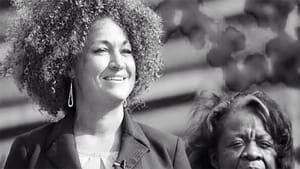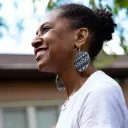Stay in the Loop
BSR publishes on a weekly schedule, with an email newsletter every Wednesday and Thursday morning. There’s no paywall, and subscribing is always free.
The confusing case of Rachel Dolezal

After nearly two days of labor, my daughter, Kiana, was born with a pout on her perfect, pink lips. Exhausted, I gazed at her long fingers and feet, and wondered if she'd be a pianist, like me (the answer is, no, at least, not so far). Mainly, though, I wanted to know if her pale skin color would be permanent, because it was a shock that my child was so very white.
She quickly became more beige than porcelain. I forgot how much lighter-skinned my daughter is than I am, though, until recently, when she told me that her high school classmates assumed one of her parents is white. She informed those who'd asked that both of her parents are black, and word got around, as it does in high school, and she became involved in a discussion about the things African Americans deal with. When she said she understood, one of her fellow black students dismissed her, saying she wasn't really black, perhaps because she also loves musical theater, has little grasp of Ebonics, and enjoys playing guitar while singing folky ballads.
This is a struggle I’ve dealt with myself. When I moved from Western Canada, where black people were relatively rare, to New York to study at Juilliard, I learned that I wasn't quite as “black” as I thought — I didn't know the slang, hadn't grown up listening to classic R&B, and didn't get some of the jokes. At least being at a conservatory helped me to avoid the view, held by wider black culture, that classical music isn't black — an opinion still held, as evidenced in a recent series in Essence recognizing black classical musicians. I'm grateful that we're mentioned at all, having been ignored for years, but every piece comments on the performer's bona fides — that tenor Lawrence Brownlee, for example, grew up singing gospel in church.
Learning to love ourselves is difficult anyway, but it’s especially challenging when the wider world conveys messages, implicitly or explicitly, that there's something inherently negative or inferior about you. At the same time, though, redefining these identities as something positive (as in the Black Is Beautiful movement) can result in codes of conduct that straitjacket people just as completely. “Keeping it real” is another code for conforming to an urban stereotype of blackness.
The nature of passing
What does it mean to be perceived by others as belonging to a race different from the one indicated by the color of your skin and the texture of your hair? What does it mean to intentionally present yourself — or understand yourself — in such a way?
These questions are raised, obviously, by the recent discovery that Rachel Dolezal, former head of the Spokane NAACP, is not, in fact, black. Many black people who could pull it off have passed for white for obvious reasons, given the virulent racism that is woven into the fabric of American history. But a white woman passing for black, except to write a book about it (á la John Howard Griffin's Black Like Me), is a bit confusing.
There have always been wannabes — people who love the culture so much that they wear African clothing, listen to jazz (or hip-hop), use the slang, and hang around black people as much as possible. But rarely has someone tried, on a systematic basis, to invite the sometimes negative reaction that looking black all the time can create.
Cultural constraints
Are we constrained to participate only in the culture, and cultural roles, into which we are born, or do we have the right to define ourselves as we see fit? Our society is in the midst of figuring out how to relate and react to transgender people — we’re getting comfortable with the idea that sex is defined by biology, but gender is more complex. Is race a construct similar to gender? People who are transgender portray their identification as something they were born with. Does it make sense, though, that a white woman could be born identifying as black? Obviously not.
In Matt Lauer’s interview with Ms. Dolezal, she mentioned identifying as black since the age of five. When I was five, I ran around the house with a towel on my head, pretending it was my long, straight hair, but apparently Ms. Dolezal did the opposite, choosing to draw herself in shades of brown rather than peach.
A heritage of racism
Ms. Dolezal apparently did a great job revitalizing the Spokane chapter of the NAACP — an organization that was founded, in part, by white people. Could she have done her job just as well if she'd maintained her original straight blonde hair and light skin? Black people have developed an understandable sensitivity about white saviors. Would her previous incarnation have gotten a chance?
I am writing this on the anniversary of the 1944 date on which 14-year-old George Stinney, who was black, became the youngest person in American history to be executed in the electric chair, condemned to death by the state of South Carolina for killing two young white girls. Was he guilty? Southern black men died, both at the hands of the law and vigilante groups, for rapes and murders involving white victims that they didn't commit, so I have to wonder. Today, young black men are incarcerated for drug crimes at a disproportionate rate and with longer sentences compared to young white men. I don't think I even need to mention that the nation is finally considering whether or not black people are treated more harshly by the police.
There are real issues in this country related to race, and dynamic people who want to address them should be encouraged to do so. Honesty and transparency are important, but in the end, when the offense isn't criminal, I think that the commitment to the cause should be the paramount qualification. Underlying this, however, should be the bigger question of why race continues to matter so much. Sickle cell is real. Most of the other stuff, though, is constructed. Can we please just dismantle it?
Sign up for our newsletter
All of the week's new articles, all in one place. Sign up for the free weekly BSR newsletters, and don't miss a conversation.

 Maria Thompson Corley
Maria Thompson Corley